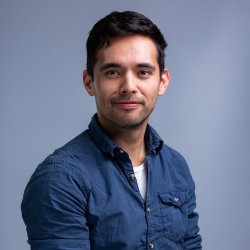Commercialisation Fellow Spotlight - Tibor Auer
We continue to share interesting and first-hand insights into the IAA Commercialisation Fellowship programme and the relationship between Research and Innovation, directly from the Fellows themselves.
Calling Surrey ECRs!
We are OPEN to receive expressions of interest and applications from ECRs based in all faculties for the new 2023 Cohort! Email your questions, interest, and applications to iaa@surrey.ac.uk.
- Are you one of our Surrey ECRs?
- Are you becoming interested in innovation?
- Are you interested in what the Commercialisation Fellowship can offer you and how it could boost your outputs?
If you said yes to these, then perhaps this is the right opportunity for you. Contact us at iaa@surrey.ac.uk with ANY questions, and apply to our 2023 Cohort!
... and now let's hear from Tibor.
Tell us about yourself, why you applied for this fellowship, and what you expect to gain
I am a Lecturer in Biological Psychology at the School of Psychology, and my research interests include assessing and improving reproducibility in neuroimaging, as well as developing approaches and tools to characterise the robustness of research findings and facilitate the adoption of best practices.
I received my undergraduate degree in medicine and my PhD in clinical neuroscience. I implemented various neuroimaging techniques in various clinical and research environments, and I led and contributed to a broad range of neuroimaging projects employing big data analysis and electric and non-electric neuromodulations.
Having worked in health, imaging, and AI (Artificial Intelligence) topics throughout my career and being involved in several professional bodies and international data science initiatives, I gathered both theoretical and practical understanding of recent challenges and trends in neuroinformatics, one of the leading disciplines in the field of AI applied in health sciences. Since I joined Surrey, I have benefitted from its strong link with the private sector. I joined the Institute of Directors and received employer mentoring, both arranged by the Doctoral College. In 2020, I attended the BusinessBoost2020 event at Surrey (organised by “Surrey IDEA”) and at Essex (organised by “The weave”). These sessions end events primed me for some basic understanding of business innovation and the mindset in the private sector. With its strong links to the healthcare industry further supported by the Surrey Heartlands Health Tech Accelerator and the recently established People-Centred AI Institute, the University of Surrey offers a unique opportunity. I want to take this opportunity to understand better the feasibility and the theoretical, practical and ethical considerations of applying AI in healthcare. During the program, I learn about the key academic and non-academic stakeholders and how to approach them, capture their needs, and assess the solutions they provide, with particular attention to how to bridge the knowledge-practice gap in healthcare.
During the fellowship, I want to gain insights into market analysis to assess and exploit opportunities for applying AI technologies in healthcare. More specifically, I want to learn how to engage with healthcare stakeholders, including public and private healthcare providers, biomedical companies, and policymakers. I also want to learn how to identify opportunities for AI in healthcare and how to convince funding agencies and potential investors.
I believe these skills are well-transferable in my research (e.g., when writing grants and applying for lectureships) and enable me to interface with academia and the industry.
How would you define ‘innovation’, how does it fit within an academic environment, and how is it relevant?
Innovation for me is about seeking out challenges and finding solutions for them, as well as providing a better ways to do things. It is a mindset, which includes creative thinking and perseverance in realisation of the ideas, while maintaining a strong focus on applicability. The two parts are what scientific research is also about, while the last part has a direct link with impact, which is an important aspect of research excellence. Therefore, an innovative approach and innovation are essential elements of being an academic.
I am passionate about methodological rigour and transparency in research; therefore, I am especially interested in how we can ensure them in our scientific practice. As an innovative approach, I combine skill and expertise from different fields, such as neuroscience, physics, statistics and informatics, to address scientific questions efficiently and transparently.
We should emphasise that innovation is not something we do, but the way how we do everything.
What do you think are the biggest barriers to innovation for researchers at Surrey, in particular within your Dpt or Faculty, and how do you suggest we address these?
As scientists, we focus on increasing knowledge rather than using it. It is especially true to theoretical subjects. As impact became part of research excellence, academic stakeholders, including funders and scientist became more conscious about the applicability of the gathered knowledge, which is a significant step towards innovation.
In academia, however, our primary commitments are research and teaching, and innovation is not considered an integral part of any of these activities only recently. Therefore, people usually consider innovation as something 'extra' to demonstrate after paying most of their attention on their primary duties. We should emphasise that innovation is not something we do, but the way how we do everything.
Another aspect of innovation is commercialisation, which can be a lengthy process often unfamiliar to academics. Although, the University of Surrey provides a comprehensive support throughout the process, there is a need to increase awareness of these services.
What are you plans over the next 12-18 months and how might this fellowship support those plans?
Having just finished my post-doc project, I have become more conscious about my career. I have already started applying for fellowships and positions to consolidate my research to improve the translation potential of neuroimaging in mental health research. During this fellowship, I expect to learn about gaps and opportunities in “AI in healthcare”, which will help me refine my research interest and develop research ideas. Engaging with stakeholders allows me to perform a more comprehensive landscape analysis and build more convincing research proposals with a strong applicability prospect.
How has the start of your fellowship begun? Who have you met, what projects are you involved with, and what things have you already learned? – was anything unexpected? Did reality meet your expectations?
The first months was rather about learning and getting used to the environment and the lingo very different from what I used to. There has been a steep learning curve! Now, I started working on innovation projects under closed supervision I truly appreciate. There is good sense of graduality, and I am positive that I can learn a lot about innovation activities from these projects, while they can be valuable for the University, as well.
If so, how has the fellowship changed your approach to innovation? What are your expectations for the rest of the fellowship e.g. things you’re looking forward to?
I have learned to appreciate the diversity of knowledge exchange and technology transfer activities and the variety of support the University can provide to the academics. I have learned about the management of intellectual properties and the data on knowledge exchange at the University. The discussions with senior academics have raised my awareness to the practical and cultural challenges of innovation.
What would you say to a prospective ECR considering applying to the fellowship?
Stop considering and start applying! 😊 It is a unique, risk-free opportunity for academics to acquire experience in innovation and academia-business partnerships.
Survey
Question | 😱 | 😵💫 | 😐 | 🤓 | 🔥 |
|---|---|---|---|---|---|
Before your Fellowship, what was your practical understanding and application of impact, knowledge exchange and commercialisation activities? |
| ✅ |
|
|
|
Before your Fellowship, what was your understanding of IP? | ✅ |
|
|
|
|
Before your Fellowship, what was your awareness for the relevance of innovation to the academic career? |
|
|
| ✅ |
|
Before your Fellowship, how confident were you to approach industry with a commercial opportunity and to manage that relationship? | ✅ |
|
|
|
|
Before your Fellowship, what was your awareness of the Innovation Strategy teams and their functions? |
| ✅ |
|
|
|
Overall, how do you feel about Innovation now? |
|
|
| ✅ |
|


